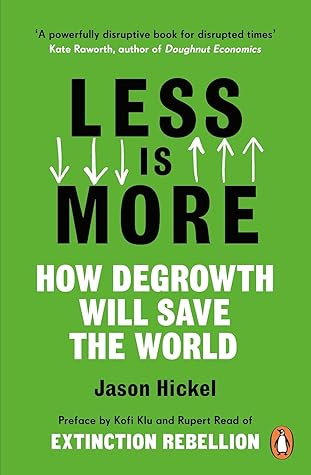More on this book
Community
Kindle Notes & Highlights
by
Jason Hickel
Read between
February 1 - February 8, 2023
Researchers at the University of London have demonstrated that a full range of what they call Universal Basic Services could be publicly funded (with progressive taxation on wealth, land, carbon, etc.) at costs much lower than we presently spend, while guaranteeing everyone access to a decent, dignified life.
The constant threat of unemployment is due to an artificial scarcity of jobs.
The structural compulsion to work unnecessarily long hours leaves people with so little time that they have no choice but to pay firms to do things they would otherwise be able to do themselves: cook their food, clean their homes, play with their children, care for their elderly parents.
Capitalism transforms even the most spectacular gains in productivity and income not into abundance and human freedom, but into new forms of artificial scarcity.
[Debt cancellation] would be salutary not just because it would relieve so much genuine human suffering, but also because it would be our way of reminding ourselves that money is not ineffable, that paying one’s debts is not the essence of morality, that all these things are human arrangements and that if democracy is going to mean anything, it is the ability to all agree to arrange things in a different way.52
Over and over again, the scientists found that under democratic conditions, resources were sustained for future generations, at 100% capacity, indefinitely. The scientists ran the experiments for up to twelve generations, and they kept getting the same results: no net depletion. None.
One of the reasons we’re staring down the barrel of an ecological crisis right now is because our political systems have been completely corrupted. The preferences of the majority who want to sustain our planet’s ecology for future generations are trumped by a minority of elites who are quite happy to liquidate everything.
If our struggle for a more ecological economy is to succeed, we must seek to expand democracy wherever possible. That means kicking big money out of politics; it means radical media reform; strict campaign finance laws; reversing corporate personhood; dismantling monopolies; shifting to co-operative ownership structures; putting workers on company boards; democratising shareholder votes; democratising institutions of global governance; and managing collective resources as commons wherever possible.65
They found that across ecosystems, from wet forest to dry forest, it takes an average of only sixty-six years for a forest to recover 90% of its old-growth biomass, completely naturally.
As far as the Achuar are concerned, most of the plants and animals that populate the jungle have souls (wakan) similar to the souls of humans, and are therefore classified, literally, as ‘persons’ (aents).
The moral code at play here is not that you should never take (that would lead to a quick demise), but that you should never take more than the other is willing or able to give – in other words, never more than an ecosystem can regenerate.
Scientists estimate that 80% of the planet’s biodiversity is to be found on territories stewarded by Indigenous peoples.8 Clearly they are doing something right. They’ve protected life. They’ve nourished it. Not out of charity, or because it’s beautiful, but because they recognise the fundamental interdependence of all beings.
Given this history, it becomes clear that any process of decolonisation must therefore begin with a process of de-thingification. This is what Indigenous scholars teach us: that we must learn to see ourselves once again as part of a broader community of living beings. If our approach to degrowth does not have this ethic at its heart, then we have missed the point.
If you were to count up all the cells that constitute your body, you’d find that more of them belong to other lifeforms than belong to ‘you’ as such.
The ecologist Monica Gagliano has published groundbreaking research on plant intelligence, showing that plants remember things that happen to them, and change their behaviour accordingly.
Having just ten more trees on a city block decreases cardio-metabolic conditions in ways comparable to earning an extra $20,000. And it improves one’s sense of well-being as much as earning an extra $10,000, moving to a neighbourhood with $10,000 higher median income, or being seven years younger.28
The British scientist James Lovelock and his American collaborator Lynn Margulis have described the Earth as a superorganism, which automatically self-regulates in a manner that maintains the conditions for life, just as the human body self-regulates to keep internal systems in functional balance. This is the Gaia hypothesis,
There’s nothing necessarily unethical about harvesting crops or cutting down trees, they say – or even hunting and eating animals, for that matter. What’s unethical is to do so without gratitude, and without reciprocity. What’s unethical is to take more than you need, and more than you give back. What’s unethical is exploitation, extraction and, perhaps worse still, waste.
Instead of just encouraging reciprocity with ecosystems, they are giving nature the rights of legal personhood. If this sounds wild, take a minute to remember that we already give personhood status to certain non-human entities: namely, corporations.
In 2017, the Whanganui River – the country’s third longest river, which the Maori people have long considered to be sacred – was declared a legal person. It is now recognised as ‘an indivisible and living whole from the mountains to the sea’, incorporating both its physical and metaphysical elements.
Degrowth begins as a process of taking less. But in the end it opens up whole vistas of possibility. It moves us from scarcity to abundance, from extraction to regeneration, from dominion to reciprocity, and from loneliness and separation to connection with a world that’s fizzing with life.


